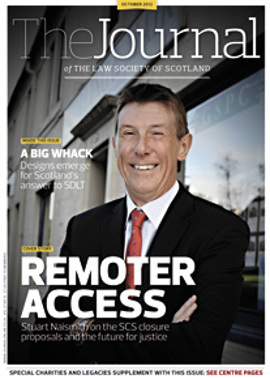Society presents "ambitious plans"
Action to support the profession economically, and to enable the Society to take its place in the new legal services market, featured strongly in the address by Law Society of Scotland chief executive Lorna Jack to the Society’s special general meeting last month.
Presenting the Society’s corporate plan for 2012-13, Jack said it highlighted “the key areas of focus for the Council, our committees and staff for the coming year as we seek to best serve our ever-changing membership and ensure we maintain the confidence of those using legal services”.
She added: “We know that, while a number of firms are now pulling out of the decline following the downturn, many of our members are continuing to run their businesses under significant financial constraints. This is why Council decided not to raise the practising certificate fee, but we still have ambitious plans for the year ahead.”
Priorities for the coming year include working towards being accredited as an approved regulator of alternative business structures; maintaining a sustainable system of publicly funded legal aid; promoting members’ interests in relation to mortgage lender panels; and continuing the Society’s access to justice work, including a new project that improves referral networks through providing better information and signposting.
Building up the profession
The first of the Society’s objectives pursued through the plan is to help ensure excellent solicitor professionalism and reputation. The Society now has a more informed picture of that reputation, thanks in part to public polling conducted last year which yielded some positive results, with around two thirds of respondents saying they had a good idea of the services solicitors provide and felt solicitors helped people with difficult situations.
It also found that 95% of those polled said they trusted their own solicitor, and 86% the solicitor profession as a whole. “The results certainly allowed us to put to bed the old adage that everyone trusts their own solicitor but distrusts everyone else’s”, Jack said.
Under the heading of helping members be economically active and sustainable, she stressed that the Society made no apology for focusing on protecting the legal aid budget. “Even members not working in legal aid say they see this as a priority for the Society, and there are some specific challenges in terms of proposed criminal contributions and possible proposals for contracting.
“We also want to develop new support to help unemployed lawyers, a relatively small proportion of the profession, but still a proportion to whom we have an important duty to help where we can.
“And we want to continue to work with Scotland’s principal business organisations to ensure public policy decisions are taken in way that help our members’ firms thrive in an increasingly competitive – globally competitive – market.”
Top of the list
However she put the coming changes in the legal services market at the head of the Society’s priorities.
“Probably the most significant action in our corporate plan is our application to the Scottish Government to be approved a regulator of new licensed legal service providers, which we will progress by the end of this year. We may not be the only licensing body and so [our objective of ensuring the Society is the professional body and regulator of choice] applies here too.
“Five years on from the passing of the Act that created the Scottish Legal Complaints Commission, we also think it is worth looking at how the legislation has been working in practice, and work with the Commission and others to see what changes could be made to make that system simpler – to make it better – for the public and for solicitors.”
The Society is also looking into whether it should apply to being able to regulate the legal services provided by Scottish based firms in other parts of the UK. “Given the changes in the legal services market, particularly with mergers and acquisitions creating larger cross border firms, we think that is worth at least exploring”, Jack said.
Other business
The meeting voted to retain practising certificate costs at £550 for a third successive year, though Council has agreed a £5 rise, from £70 to £75, to the cost of remaining on the roll of solicitors.
Also at the meeting, solicitors agreed a constitutional change to permit the introduction of electronic voting of future Society office bearers by Council members.
Ross MacKay, convener of the Property Law Committee, gave an interim report on the Society’s investigation into the merits of separate representation in property transactions following changes to mortgage lender panels. This is still being discussed with other interested parties and it is hoped to present a report with recommendations to the AGM next May.
In this issue
- Players and winners
- Access to client money?
- Tax and residential property
- Trusts and the family business
- Planning: the next level
- Reading for pleasure
- Opinion: Tom Mullen/Alan Paterson
- Council profile
- Book reviews
- President's column
- Deed plan criteria
- Decision time for justice
- "Can do": can you?
- Taxes heading north
- When the agent answers
- Taking care of child cases
- Collective redress
- Making sense of hearsay rules
- Don't forget the register
- Alcohol: the healthy option
- Seeding scheme is a draw
- Scottish Solicitors' Discipline Tribunal
- Human trafficking: is the system responding?
- Power points and positive rights
- A way to apply yourself
- Society presents "ambitious plans"
- Law reform roundup
- Business benefits
- On the right track
- Ask Ash
- Business radar
- Legacies: the untapped potential
- Charity begins at law
- Love them and leave to them
- Those difficult relatives






